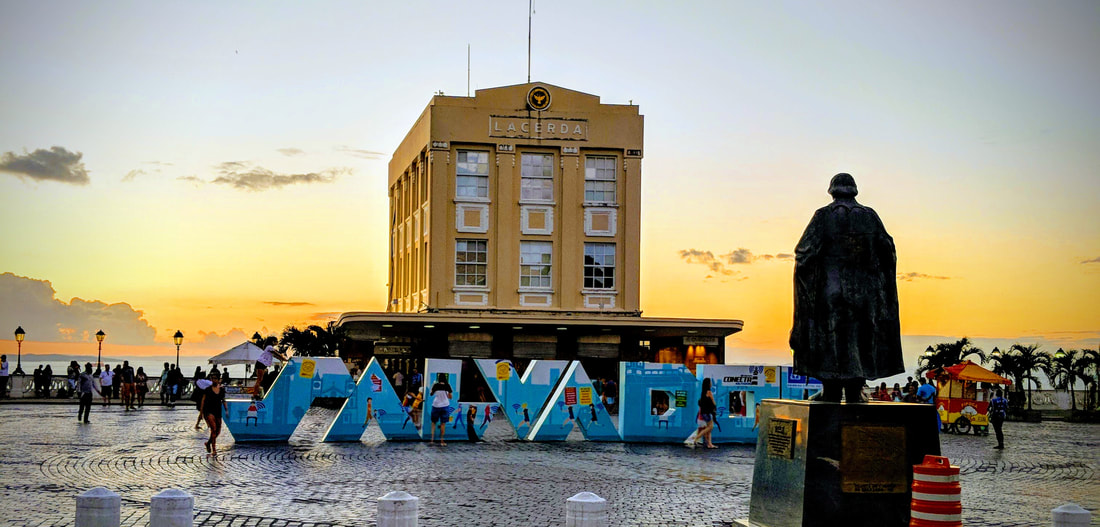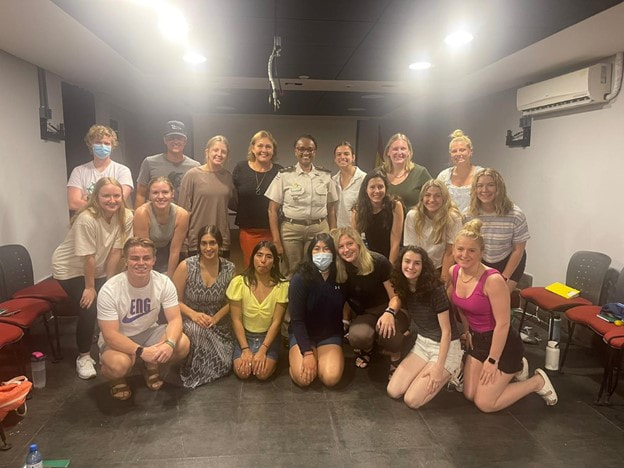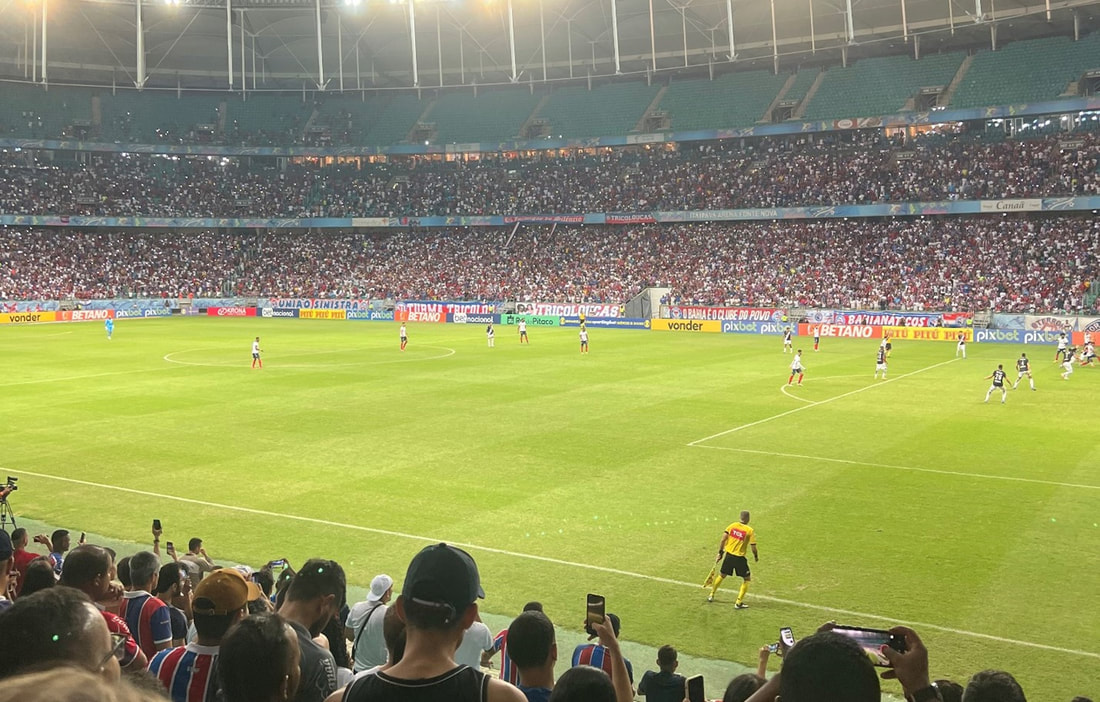|
Yesterday I had the first meeting with the students who will be joining me in Brazil in May 2023. We start classes in March, but I get way too excited and want to start sharing stuff as soon as I can with students!
This first post is a review of the stuff we did in 2022. To complement the class, I invited various scholars to campus and remotely to help my students understand more about Brazil. Below are the recordings for some of these talks!
Spotlight on Brazil Series - Brazil under US influence: 1964-2021, Xavier Vatin
Spotlight on Brazil Series - Social inequalities in Brazil: Effects and Outcomes in Life and Health Conditions, Clarice Mota
Spotlight on Brazil Series - An Informal Conversation on Racial Issues & Basketball in Brazil, Jamir Garcez
Spotlight on Brazil Series - Fernando Conceição: Violence Against Minorities - Brazil & US, Fernando Costa da Conceição
0 Comments
By Hailey Karnowski As my time here in Brazil comes to an end, I thought I would share two of the most memorable experiences that I had that deepened my understanding of Brazilian culture and led me to further question the persistent topics regarding gender. Earlier this week, our group had the pleasure of hearing from Major Denice Santiago who is a police officer in Salvador and has helped create a branch of the police force focused strictly on violence against women. Major Denice informed us about the horrors that women face in households, and how justice was rarely sought due to the fear of not being believed or not having any resources in the first place. I had figured that there was still inequality between men and women—since some of our prior research had suggested that—but was clueless to the fact that violence against women ceases to exist across many aspects of the culture. Before traveling, one of the subtopics we studied was gender’s role in Brazil. One article explained how Brazil still sees a lack of representation of women in power and it was not until 1994 that a woman was elected at the state level (dos Santos and Thomé, 2021). Knowing this, I thought it was amazing that Major Denice started in the police force at the age of 18 and holds a high ranking, but she mentioned to us that there is only so high of a position that women officers can get. Another article expressed how massive the women’s movement in Brazil was to gain the ability to vote only to be faced by backlash, and Major Denice’s talk amplified the idea that this movement has yet to see full equality (Maruci, 2018). Back to Major Denice’s important topic discussed in her lecture—the violence against women in Brazil has plagued numerous households and has not received the social and governmental attention that it needs. Thankfully, Major Denice helped start a program to solely assist in cases and incidents regarding violence against women, but an earlier experience that I had led me to believe that this violence might not just be in the household. Last week, those who wanted to were able to see a live Brazilian soccer match at the stadium in Salvador. For those unfamiliar with Brazilian soccer, soccer or “futebol” is arguably one of the most significant parts of Brazilian culture and helps unite the states and country. As an article we explored suggested, soccer is so popular because anyone can play it no matter the race or socioeconomic background and the sport has become a part of many Brazilians’ identity (Eakin, 2017). It truly brings all sorts of different people together, and as a person who loves sports, it was incredible to see this in person. The game started out like any other major league sport with fans cheering, people buying cups of beer, and guys selling snacks throughout the crowd. However, as the game became tied and the fans became frustrated, I heard numerous sexist slurs being yelled at the players, referees, and even to other fans. I was shocked at some of the things that were being said—of course I know how Americans can get with hockey and football—but it was maddening hearing that the slurs regarded women. It was not until after the game during our lecture with Major Denice that I found out that soccer games are a huge driving force with domestic violence and that the special taskforce actually stays at the stadium to ensure that no women are being harassed or hurt. It was extremely eye opening that a sport so important to a nation holds some toxic behaviors that further the inequalities that women face in society. This experience made me look at Brazil on a more intersectional level, and I realized that although things like soccer are important for unity, there still may be some people that are disadvantaged from it. Although our course explored inequalities persistent in Brazilian culture, I think it is important to note the changes that are currently being made for a more equal and equitable society for women and other marginalized groups. Since the beginning, powerful women activists have made monumental impacts on the culture that is seen today. Take Bertha Lutz and Dilma Rousseff for example. The two women fought against all odds to further women’s rights and gain political power (Noriega, 2020). Since then, women like Major Denice Santiago have been continuing this journey to fight for women’s rights, and their actions have not gone unnoticed. I can only hope that Brazil and the United States continue these efforts toward equality. Works Cited: Eakin, Marshall. “The Beautiful Game: Performing the Freyrean Vision” (2017). In Becoming Brazilians: Race and National Identity in Twentieth-Century Brazil (New Approaches to the Americas, pp. 165-199). Cambridge: Cambridge University Press. doi:10.1017/9781316800058.007 dos Santos, Pedro A. G. and Thomé, Débora, "Women and Political Power in Brazil" (2021). Political Science Faculty Publications. 70. https://digitalcommons.csbsju.edu/polsci_pubs/70 Maruci, Hannah. “Women’s struggle to vote in Brazil: same fight, different strategies” (2018). Oxford Human Rights Hub. https://ohrh.law.ox.ac.uk/womens-struggle-to-vote-in-brazil-same-fight-different-strategies/ Noriega, Christina. “Herstory: 12 Brazilian Women Who Changed the Course of History” (2020). ReMezcla. https://remezcla.com/lists/culture/herstory-brazilian-women-changed-course-history/  Hailey Karnowski is a rising senior at the College of Saint Benedict, pursuing a major in sociology and minor in political science. She is originally from Farmington, Minnesota. Hailey is the new president of the CSB rugby team and works for IT Services. She hopes to work in social work or criminology after graduating and is looking forward to gaining new experiences and perspectives while studying abroad. Turns out I got more busy than I thought these past weeks and I have not been able to post links about Brazil. In one month we start class and then we will be talking about this stuff constantly. Exciting stuff. I wanted to share a few more links for articles that connect to what we will be discussing in class and in our May trip in Brazil. First, Nevin shared a nice little NY Times article about what to do in Salvador in 36 hours. We are going to spend more than that there, so hopefully you get to experience everything this article shares. Second, let me share some posts I had saved from a few months (or years ago). I figured I would share it now since these are things related to class but different from our assigned readings. On the topic of race, a resource I meant to share earlier is the Rough Translation (a great podcast BTW) episode on Brazil's affirmative action programs. This is a super interesting dive into the controversial topic. On the topic of inequality, this Oxfam profile on Brazil provides a snapshot of the issues we will see, and this PBS NewHour segment shows the ways people are using technology to tackle inequality in the country. On the topic of gender, while not specifically about Brazil, this NY Times opinion piece talks about women's empowerment to fight violence. I think this will be all for now. I will see the class in a month. If anything interesting pops up before I will post something. If not, see you in a month! WHAT I AM LISTENING TO RIGHT NOW: Majur-Africaniei This is my first post sharing interesting links that can help you understand more about Brazil. First, some fun news from Salvador, where we will spend most of our time in May of 2020. This year a large shopping mall in the city hired its first Black Santa. Even though the city is over 80% black or of mixed descent, this is the first time a mall decided to change the perspective of what it means to be Santa. Here is a link to the news from a Brazilian website. This was the only link I found in English. Below I will now share two videos. The first is a classic video from PBS and Henry Louis Gates Jr. that is part of his Black in Latin America series. The episode on Brazil does a good job at showing some of the basic issues with the idea of racial democracy in Brazil. The second video is an interesting video posted by the Chinese Global Television Network (CGTN), posted in May of 2019, about the city of Salvador and the African roots in the city. This video provides students going a glimpse of what you will see in May of 2020. I will keep adding more videos, podcasts, and newspaper articles that I find about Brazil. If you happen to find something interesting, please share with me on Twitter, down here in the comments section, or via email. WHAT I AM LISTENING TO RIGHT NOW: BaianaSystem and Tropkillaz- Saci (Remix) |
Archives
December 2023
Categories
All
|



 RSS Feed
RSS Feed
